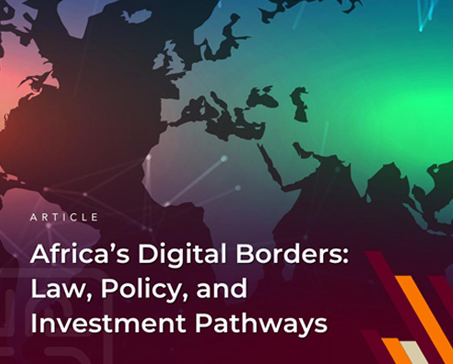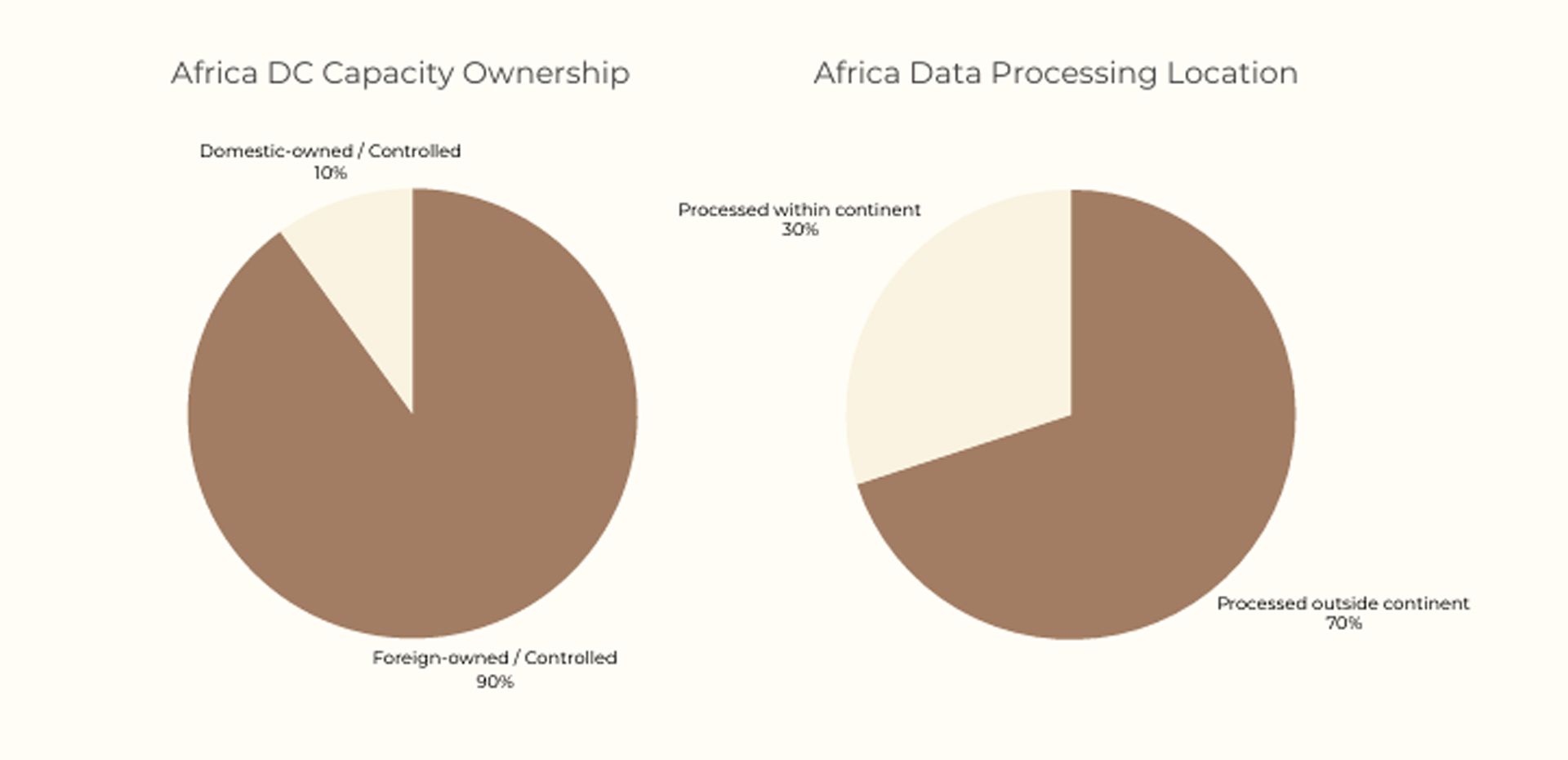

Across Africa, the digital economy is expanding at a remarkable speed. Artificial
intelligence, fintech innovations, cloud computing, and mobile-first solutions are
transforming how people live, work, and do business. With this rapid transformation
comes the critical determination of who controls the data that fuels this growth?
The doctrine of data sovereignty has become central to this debate. Policymakers
increasingly regard data not merely as a digital by-product, but as a strategic resource
tied to national security, economic competitiveness, and citizen trust. The sovereignty
debate comes with policy tensions given that while stronger data controls can empower
states to protect privacy, foster local innovation, and build resilient digital ecosystems, a
patchwork of uncoordinated national rules could risk creating digital fragmentation,
raising costs for businesses, discouraging cross-border trade, and deterring investment.
Thus, Africa now stands at a crossroads. Will data sovereignty become a catalyst for
integration and sustainable growth, or a barrier that limits the continent’s ability to
compete in the global digital economy?
In this feature, we examine how Africa can balance localisation, integration, and
investment to build a trusted and competitive digital future.
The term “data sovereignty” has taken on multiple, sometimes conflicting meanings.
Within legal contexts, the notion may refer to a legal entitlement, such as a nation’s right
to regulate its own data or an Indigenous people’s right to govern data about their
communities. As a legal framework, it may also underscore the body of laws determining
which jurisdiction’s rules apply to data storage and access. This includes data localisation
laws that require information to remain within national borders.
Furthermore, the notion has been explained as an extension of national sovereignty in the
sense that control over data is now as fundamental to sovereignty as control over land,
sea, or airspace, linking it to geopolitical power and national security. In reality, these
perspectives are not mutually exclusive. Rather, they reveal that data sovereignty sits at
the intersection of law, capability, and policy ambition.
For African states, a pragmatic understanding is essential. Data sovereignty should be
treated as the lawful and practical ability of a nation or regional bloc to control, govern,
and derive value from data generated within its territory, in a way that protects citizens’
rights, promotes trust, and enables cross-border digital trade.
The conversation on data sovereignty in Africa is unfolding through a patchwork of
national laws, infrastructure investments, and geopolitical alignments that reveal both the
continent’s digital ambitions and its structural constraints. Over 35 African countries have
now enacted some form of data protection legislation, with Nigeria, Kenya, Ghana, and
South Africa among the most advanced.
However, implementation remains inconsistent, with frameworks lacking independent
regulators, clear enforcement mechanisms, or cross-border interoperability provisions. At
the continental level, the African Union Convention on Cyber Security and Personal Data
Protection (the Malabo Convention), adopted in 2014, still faces slow ratification. Fewer
than 20 member states have ratified it, leaving vast regions without harmonised data
protection or cyber governance standards.
This lag contrasts with the European Union’s GDPR and emerging regional initiatives in
Asia, where there are established enforceable norms for data processing, localisation, and
privacy. Africa’s lag in achieving similar coherence underscores a deeper policy dilemma
as to how to assert digital sovereignty without stifling the innovation and integration
needed for scale.
A key trend is the push for data localisation, requiring companies to store or process data
within national borders as a means of asserting control. This approach is influenced by
governance models like China’s state-centric model that asserts the government's
ultimate authority over data within its borders, driven by national security, economic
development, and social stability goal. Senegal was the first African country to adopt the
approach of emphasising strong state control and mandatory local hosting.
Across the African continent, over 700 new data centres are projected to be built within
the next decade, many of which are to be funded or operated by foreign hyperscalers and
multinational corporations. While this reflects strong investor confidence, it also raises
concerns about “data capitalism” or even “data colonialism”, where foreign entities
dominate digital infrastructure ownership, value extraction, and governance. Without
sufficient local energy reliability, connectivity, skills and a balanced regulatory framework,
these facilities risk becoming enclaves of external control rather than engines of local
digital empowerment.
What is clear is that true capacity and digital equality are crucial in balancing the policy
reasons for data regulation in this area since Africa’s pursuit of data sovereignty is purely a
geopolitical balancing act that must reconcile legitimate security and economic interests
with the risk of new forms of dependency.
While the appeal of data sovereignty is clear - promising national control, economic empowerment, and digital trust, its practical implementation presents significant challenges. Understanding them is crucial for African governments and businesses seeking to build sustainable digital economies. These challenges are presented across the key focus areas outlined below.
Unlike land, oil, or gold, data is non-rivalrous, which means it can be copied, shared,
and transferred at near-zero cost without any loss of quality. This fluidity makes
traditional sovereignty analogies (such as territory, borders, ownership) difficult to
sustain. Further, the meaning and value of data are context-dependent and can
alternate across applications, sectors, and geographies. In Africa’s emerging data
markets, this means sovereignty cannot simply mean “keeping data at home.”
Instead, it must mean developing the capacity to understand, govern, and extract
value from data, wherever it flows.
Digital sovereignty must extend beyond data localization. While there is justification
for the approach of mandating data to be stored within national borders or in locally
owned data centres, there may simply risk creating isolated data silos which barely
yield real autonomy or value creation without adequate governance frameworks,
technical capacity, or regulatory oversight.
Recommendation: True sovereignty must therefore be functional, not merely
territorial and will require the capability to understand, govern, and monetise data
flows, wherever they occur. This means investing in the analytical, institutional, and
technological capacity to extract insight, ensure compliance, and participate
competitively in global digital value chains. Regional approaches under frameworks
like the AU Data Policy Framework or the AfCFTA Digital Trade Protocol can also help
reframe sovereignty as shared capability rather than rigid localisation, promoting
both control and connectivity.
Africa’s data infrastructure remains heavily reliant on foreign hyperscalers and external cloud ecosystems, which control where data is stored, how it is managed, and who can access it. Centraliszed cloud infrastructure, combined with inadequate local connectivity and energy reliability, creates a position of digital dependency.

Recommendation: African governments must pursue technical sovereignty and the capacity to design, manage, and interconnect their own digital infrastructure. This means promoting interoperable, modular, and open architectures that prevent vendor lock-in, expanding regional cloud infrastructure partnerships, and incentivising African-owned data infrastructure through blended financing and public–private models.
Sovereignty is meaningless without comprehension. Across the continent, both
public institutions and private enterprises increasingly adopt digital platforms and
cloud services without a clear grasp of where their data resides, under what legal
regimes it operates, or how it is processed and monetised. This epistemic gap
creates vulnerabilities to data misuse, privacy breaches, and external control. It also
constrains innovation, as uncertainty about compliance deters firms, especially
SMEs, from embracing cloud technologies or cross-border services. Bridging this
gap demands a multi-level response.
Recommendation: Governments must strengthen regulatory literacy and
institutional capability. Attention should also be placed on establishing independent
data authorities empowered to audit, trace, and assess data flows. Businesses need
governance frameworks and risk-assessment tools that map their data assets and
obligations. Regionally, shared standards for data classification, metadata
transparency, and legal interoperability could enable Africa to manage its data
ecosystems with greater confidence.
Parsons stands at the forefront of Africa’s evolving data landscape, serving as the go-to
Firm for organisations and even the government on navigating the complex intersection
of data governance, regulatory compliance and digital sovereignty. We understand that
Africa’s digital transformation depends not only on technological innovation, but also on
the creation of robust, context-sensitive frameworks that protect data, foster trust and
promote sustainable digital growth.
Leveraging our multidisciplinary expertise, Parsons provides end-to-end advisory support
on data governance, privacy compliance, cross-border data flows, localisation strategies,
and policy development.
Africa’s data sovereignty challenge is not just about where data is stored but who owns,
governs, and benefits from it. True digital sovereignty will require African-owned
infrastructure, indigenous data governance frameworks, and capacity-building initiatives
that empower local regulators, businesses, and civil society to manage data responsibly
and transparently.
Momentum is building for more coherent continental action. The African Continental Free
Trade Area (AfCFTA) Digital Trade Protocol and the AU Data Policy Framework represent
important steps toward regional harmonisation, interoperability, and cross-border trust. If
effectively implemented, these initiatives could position Africa not as a passive consumer
of global data norms but as an active architect of its digital destiny.
Legal Disclaimer: This publication is intended for general informational purposes only
and is not a substitute for professional legal advice. The information provided herein may
not be applicable to your specific circumstances and should not be relied upon as legal
counsel. For advice tailored to your situation, you should consult with qualified legal
counsel.
Contact us to discuss opportunities across Africa’s critical digital economy at
info@Parsons-legal.com.
1. African Development Bank Group, ‘Congo: New Data Centre Funded by African
Development Bank Will Cement National and Subregional Digital Sovereignty’ (News
and Events, 17 May 2024) https://www.afdb.org/en/news-and-events/congo-new-data
centre funded-african-development-bank-will-cement-national-and-subregional
digital sovereignty-70847
2. Coleman D, ‘Digital Colonialism: The 21st Century Scramble for Africa through the
Extraction and Control of User Data and the Limitations of Data Protection Laws’
(2019)
24(2)
Michigan
Journal
https://doi.org/10.36643/mjrl.24.2.digital
3. Soulé F, Navigating Africa’s Digital Partnerships in a Context of Global Rivalry (CIGI
Policy Brief No 180, 2023) https://www.cigionline.org/publications/navigating-africas
digital-partnerships-in a-context-of-global-rivalry/
4. African Union Commission, African Union Data Policy Framework (Addis Ababa, 2022)
https://au.int/en/documents/20220329/african-union-data-policy-framework
5. Economic Commission for Africa, Building Africa’s Data Ecosystem for Sustainable
Development (UNECA, 2023) https://repository.uneca.org/
6. Kwet M, ‘Digital Colonialism: US Empire and the New Imperialism in the Global South’
(2019) 6(2) Race & Class 62
7. Makulilo AB, ‘Data Protection in Africa: An Overview of Legal and Institutional
Frameworks’ (2021) International Data Privacy Law 11(4) 331
8. Ndung’u N, Signé L and Stork C, The Future of Africa’s Digital Economy: Paving the
Road to Inclusive Growth (https://www.brookings.edu/ Institution, 2022)
9. Nyst C and Monaco N, Government Access to User Data: A Comparative Analysis of
Surveillance Laws and Practices in Africa (Global Network Initiative, 2021)
https://globalnetworkinitiative.org/
10. Taylor L and Broeders D, ‘In the Name of Development: Power, Profit and the
Datafication of the Global South’ (2022) 40(3) Geoforum 153
11. World Bank, Digital Africa: Technological Transformation for Jobs (World Bank, 2023)
https://www.worldbank.org/en/programs/digital-africa